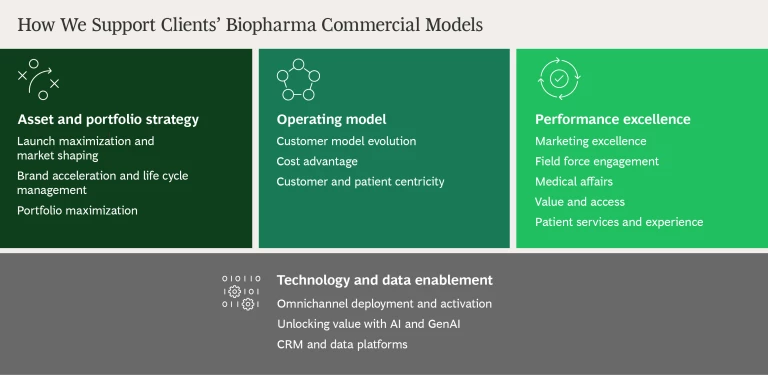How We Enable Biopharma Excellence
R&D Innovation
The pandemic spurred adoption of digital and data analytics to improve R&D efficiency, including the use of virtual trials and AI to discover new drugs. We help clients allocate R&D resources and optimize the value of assets in their development pipeline across a variety of specialties, including oncology.
Next-Generation Commercial Models
BCG brings unrivaled go-to-market knowledge, experience, and capabilities to leading biopharma and biotech companies. Our biopharma consultants collaborate with both market leaders and market innovators to address the toughest go-to-market challenges, including maximizing the value of products and portfolios; evolving go-to-market models and optimizing investments; driving superior performance across cross-functional teams; and identifying opportunities to leverage technology to create competitive advantage.

- Asset and Portfolio Strategy. Our biopharma consulting experts help clients maximize product performance through launch, brand acceleration, portfolio strategy, and due diligence. We’ve successfully influenced brand and portfolio trajectories across a wide range of therapeutic areas.
- Operating Model. The need to reinvent biopharma and biotech commercial models is urgent due to shorter timelines, rising costs, technological advances, and changes in how health care is practiced. We accelerate the shift to customer- and patient-centric models—and do so with a focus on talent and change management.
- Performance Excellence. Achieving exceptional results in cross-functional models begins with performance excellence. As the health care landscape continues to rapidly evolve, leaders must adapt quickly and decisively. Our biopharma consulting experts guide the change agenda across functional areas, driving enterprise-wide success and impact.
- Technology and Data Enablement. AI and GenAI hold unparalleled potential, but effective implementation is key. Our biopharma consultants bring cutting-edge expertise to define and execute our clients’ change agendas, ensuring that they are able to capture the full value of these technologies across their go-to-market models.
Meet our Commercial Experts

Excellence in Operations
For companies that provide biopharma manufacturing solutions, operations play a major role in their mission of delivering life-enhancing medicines. We collaborate with clients to improve operations—using customized solutions for manufacturing, supply chains, and distribution and logistics—while maintaining and improving product quality and adhering to industry regulations.
Corporate Finance, Strategy, and M&A
In an evolving biopharma industry, players must continuously monitor where the market is headed—along with the strength of their product portfolio—in order to determine which alliances or M&A activity to pursue, which assets are noncore and ripe for divestiture, and how to ensure effective post-merger integration. Our product portfolio strategies extend to the group, business unit, and therapeutic-area level.
Digital and Analytics Capabilities
In addition to working with companies to bring new drugs to market faster by applying AI and machine learning, BCG helps biopharma sector companies improve performance in manufacturing and supply chains by using data analytics to enhance decision making and uncover insights. We teach companies how to incorporate digital into sales, marketing, and customer engagement, and use analytics to identify the M&A and new technology options that could complement their existing product portfolio.
Our biopharma consultants work closely BCG’s specialty businesses on specific value-chain priorities, including digital supply chain, next-generation sales, personalization, and digital marketing. With our guidance, companies can rapidly scale new capabilities and ways of working through agile at scale, data and digital platforms, and our Build-Operate-Transfer approach. We also collaborate with technologists, scientists, programmers, engineers, and human-centered designers from BCG X, our tech build and design unit.
Our Client Work in the Biopharma Industry



Our Proprietary Biopharma Solutions
Disease Deep Dive Navigator
Disease Deep Dive Navigator
Biopharma M&A Suite
Biopharma M&A Suite
BCOMM Benchmark
BCOMM Benchmark
External Supply Benchmark
External Supply Benchmark
Yield Optimization Tool Model
Yield Optimization Tool Model
Real-Time Demand Forecasting
BCG Partners with Merck
We are proud to announce a strategic collaboration with Merck aimed at advancing the discovery and assessment of novel drug targets for chronic and degenerative diseases through AI.
Our Insights on the Biopharma Industry
















